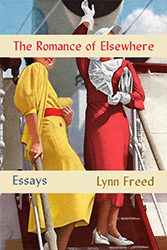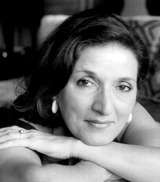
From early on, Lynn Freed had imagined for herself an ideal life: a stranger in a strange place – someone just arrived, just about to leave, and always with somewhere to go home to. As a teenager on an exchange program from South Africa to the U.S., she made up fantastic reasons to escape high school in the suburbs and spend her time in New York City. But then back in New York a few years later – married now, and a graduate student – she found herself at home neither in the place nor in the marriage.
What she did find, in the end, was a true marriage between writing and travel, travel and identity, identity and freedom. Traversing decades and continents, and back again, The Romance of Elsewhere captures the essential dilemma of the expat: where is home? Taking on subjects as disparate as Disneyland, lovers, eco-tourism, shopping, serious illness, and the anomaly of writers who blossom into full power only in old age, these essays deliver “tart, witty, writing with a bite to it.”
Praise for THE ROMANCE OF ELSEWHERE
“Freed approaches the world—and her prose—with the clear-eyed, forthright wonder required of the most committed of travelers…She is also one of the funniest writers around…(A) marvelous collection.”
—New York Times Book Review
“An offbeat world tour with a not-quite-innocent abroad.
Novelist and essayist Freed (Emerita, English/Univ. of California; The Last Laugh, 2017, etc.) isn’t the type to get hung up on wondering “should I stay or should I go?” She gets the urge for going, and she’s gone. “As it happens,” she writes, “I am at my most suggestible on the subject of belonging, because I am not much good at it.” Wanderlust is what ties these funny and astute personal essays together; the book is about what it means to have an insatiable hunger for experience. ”
—Kirkus Review
“If Joan Didion and Fran Lebowitz had a literary love child, she would be Lynn Freed–or, at least, the resulting book would be Lynn Freed’s essay collection, The Romance of Elsewhere…. The collection of 20 previously-published essays spans decades and continents, and is in equal turns funny, wise, and sardonic, charting both Freed’s evolution as a traveler and her evolution as a writer. Travelers and readers seeking an unusually un-romanticized take on wandering the world will love it.”
—Bustle.com
“No one writes funnier, more acutely observant, frank, and intelligent personal essays than Lynn Freed. If her skeptical, sardonic voice amuses us with every line, it is largely because she is a grown-up in a culture of adolescence, who has done her psychological homework and taken the full measure of her experience, mistakes included. In this, her best nonfiction collection, you will come to know her narrator as one of the most nuanced and sophisticated characters in contemporary literature, and in the process make a new friend.”
—Phillip Lopate, author of A Mother’s Tale
“Novelist Freed (The Servants’ Quarters) . . . wrestles with ‘the horror of being stuck where one lives’ and, in opposition to that horror, her attachment to the comfort, intimacy and pride of home in this collection of personal essays that spans both decades and continents. The essays, all previously published, recount her childhood and adolescence in her native South Africa and her experiences as an exchange student and young bride in New York City, a visiting professor in Texas, and a long-time resident of Northern California, an inveterate traveler all the while. Wise, evocative and darkly humorous, Freed covers Disneyland, ecotourism, lovers, servants, her wariness of milestone-birthday celebrations and the accompanying ‘hysteria for public confession,’ writers who are able to blossom in old age, and other topics. Particularly memorable are her essays about South Africa, as well as those about her upper-middle-class, mildly eccentric family’s place in it. This collection evokes different moods, different eras, and different places with an astute, frank, and pitch-perfect narrator.”
—Publishers Weekly
“In THE ROMANCE OF ELSEWHERE, the South African-born Lynn Freed offers nearly two dozen essays from a life influenced by the road. A traveler deep down in her soul, Freed says her “dreams of displacement” began “in childhood.” As a young mother, she even became a travel agent in order to hide from her family her need for escape.
“There has always been romance in distance,” she reminds us. Yet it’s the push-pull of the desire to leave coupled with the “strong attachment to the comfort, the privacy, the intimacy, and the pride of home” that has shaped Freed’s life. “The rhythm of leaving and returning has kept me nicely unsettled for over 45 years.” Without it, she confesses, “I would have drowned any desire to write in restlessness and despair.”
Freed approaches the world — and her prose — with the cleareyed, forthright wonder required of the most committed of travelers. In the essay “Keeping Watch,” she recalls growing up “luxurious but not rich, safe and yet threatened, carefree if one did not think too carefully about the future,” in apartheid-era South Africa, and of her childhood terrors at the prospect of a “Knife-at-the-Throat day” when the servants might “rise as one.”
Elsewhere she speaks eloquently of travel’s power to transform: “The traveling writer is someone seeking … a sort of non-existence, the quest for which can lead, paradoxically, to the discovery of the self set free from the bafflement of context.” And in the deceptively economic essay called “Locked In,” she reminds us just how perilous it sometimes is to be a woman in the world, no matter how seemingly placid the setting.
Freed is also one of the funniest writers around. And in “Useful Zulu Phrases, 1986,” the laugh gets caught in the throat as she offers a hilarious list of some of the helpful hints that were once offered white South Africans attempting to learn Zulu in order to better command and control their black servants. In “Caveat Viator,” she gives us a blistering, bone-true indictment of new age man’s self-aggrandizing struggles to be at harmony with the natural world — from Northern California to Africa.
In this marvelous collection’s final essay, “When Enough Is Enough,” Freed may be speaking for road warriors everywhere when she confesses to the occasional urge to “flee the things and the people that seem to hold me in place, to grab what’s left of the life and make a run for it.”
Andrew McCarthy, New York Times Book Review
Publisher: Counterpoint (October 10, 2017)
ISBN: 1619029278
Hardcover: 224 pages
